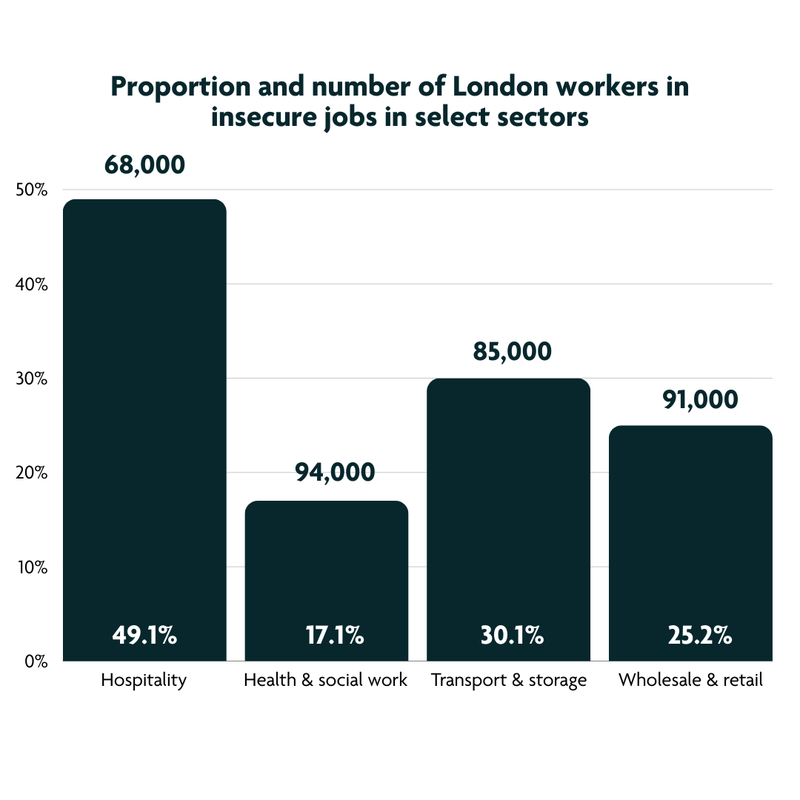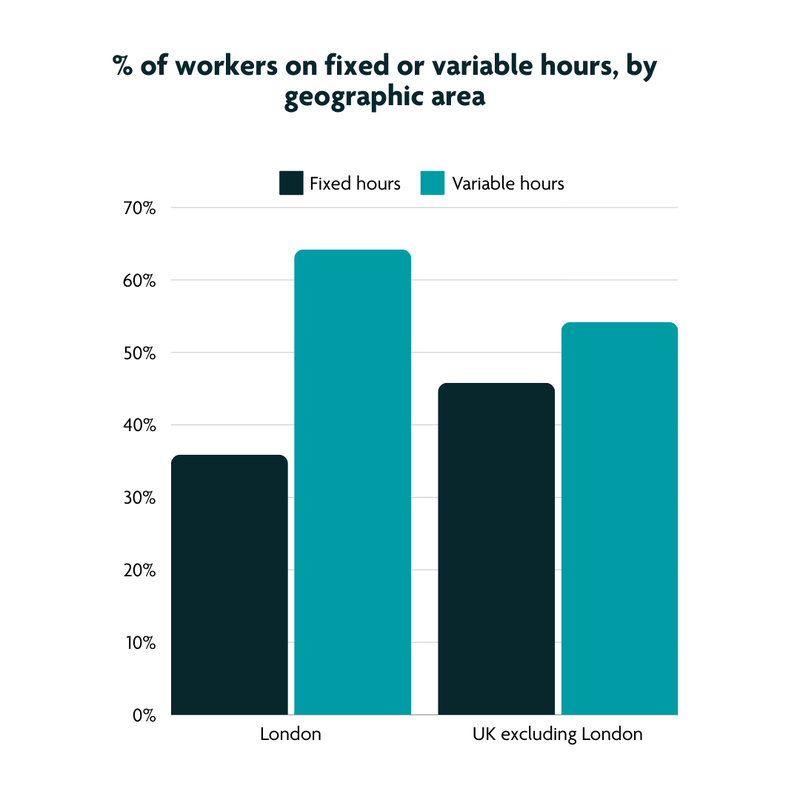London is the UK's hotspot for insecure work: new research reveals
The call for Living Hours in London is more important than ever, as the capital is found to be the region with the highest number of insecure jobs across the UK.
A new report by the Living Wage Foundation, which includes analysis of data by the Office of National Statistics (ONS), shows that more than 800,000 jobs in London are deemed ‘insecure’. With a higher proportion of variable hours, shorter shift periods and unexpected shift cancellations than other parts of the country, it’s no wonder that in-work poverty is still a stark reality for many Londoners.
Key findings
- Polling showed 64 per cent of Londoners are working variable hours compared to 54 per cent outside London
- A third of insecure workers in London report having difficulty with financial planning and almost a quarter have increased their reliance on credit or debt because of their work insecurity
- 35 per cent of London workers with variable hours said they have experienced unexpected shift cancellations compared to 25 per cent of workers outside of London. Of those workers, 92 per cent have stated that they do not receive their regular pay when this occurs.
The proportion of low-paid jobs has fallen from 20.2 per cent in 2020 to 12.9 per cent in 2023, largely due to substantial year-on-year increases in the National Living Wage.
While there has been good progress in tackling low pay in recent years through effective legislation, the same cannot be said for insecure work, another important driver of in-work poverty. Insecure work remains a significant issue in the UK, particularly in London.
What do we mean by insecure work?
The ONS defines insecure work as:
- People in non-permanent work (casual, seasonal jobs, fixed-term and agency) excluding anyone who said they did not want a permanent job
- People who report working less than 16 hours a week despite wanting to work more (I.e, under-employed)
- People who self-report volatile pay or hours while being below median income
- People on zero-hours contracts
- Low paid self-employed people.
The total number of workers in insecure jobs in the capital is higher than in any other region, with over 800,000 insecure jobs in London in 2022. While London has a slightly lower proportion of workers in insecure jobs compared to other regions of the UK, its high concentration of jobs and businesses in high insecurity sectors make insecure work a considerable issue in the capital.
Some sectors are worse affected than others

In terms of proportion of jobs, ‘hospitality’ had the highest by far with 1 in 2 workers in this sector employed in insecure jobs. However, some sectors with a relatively low proportion of insecure jobs represent a large number of insecure jobs. In the ‘Health and social work’ sector for example, 17.1 per cent of Londoners employed in this sector were in insecure jobs in 2022, but this represents a total of over 94,000 insecure jobs.
Features of insecure work
Variable hours
A majority of workers in London (64.2 per cent) are in jobs that involve variable working hours or shift patterns. This is higher than that in the rest of the UK, where 54.2 per cent of workers have jobs that involve this type of work.

Variable hours can place a burden on workers as it can make planning for their personal and work lives more difficult. It can also cause them to incur additional financial costs in the case of short shift notice periods and shift cancellations.
Shift notice periods
Variable hours make workers in insecure jobs more vulnerable to short shift notice periods and unexpected shift cancellations which in turn can negatively impact workers finances and other areas of their lives.
London workers are particularly affected by this issue, as they are more likely to face shorter shift notice periods compared with workers outside London. 88.6 per cent of London workers who work variable hours get less than four weeks’ notice for shifts compared to 82.7 per cent of workers outside of London. This includes 63.9 per cent of London workers with variable hours who get less than a week’s notice for shifts, compared to 52.6 per cent for workers outside of London.
Shift cancellations
London workers are also more likely to experience unexpected shift cancellations - 35 per cent of Londoners with variable hours said they have experienced unexpected shift cancellations compared to 25 per cent of workers outside of London.
Of those workers, 92 per cent have stated that they do not receive their regular pay when this occurs. Within the context of the current cost of living crisis, this makes it even harder for workers to budget and meet their basic needs. A third of insecure workers in London report having difficulty with financial planning and almost a quarter have increased their reliance on credit or debt because of their work insecurity.
Guaranteed hours and hours worked
Variable hours, short shift notice periods and a lack of guaranteed hours are issues which often go hand in hand.
Almost a third of workers in London have fewer than 16 hours of work guaranteed per week, compared to one fifth of workers employed outside of London. Workers in London are also less likely to be guaranteed full-time hours (35+ hours per week) than in the rest of the UK (44.6 per cent in London vs 51.3 per cent outside London). The evidence that Londoners tend to have more variable hours and be guaranteed fewer hours than workers in the rest of the UK highlights the importance of addressing insecure work in the capital.
Impacts of insecure work
Workers in insecure jobs often face an ‘insecurity premium’, which refers to the additional costs and income implications experienced by workers as a result of being employed in an insecure job. The insecurity premium refers to both direct costs incurred from things like short shift notice periods (e.g. higher costs of last-minute travel and childcare), as well as indirect costs (e.g. increased reliance on credit, increased difficulty in financial planning, and fluctuating social security payments).
A greater proportion of London workers experience almost all of these direct and indirect costs associated with insecure work, compared to workers in the rest of the UK . Well over a third of workers in London who experience short shift notice periods and/or shift cancellations have had to pay higher travel costs due to the way their hours are organised. Over a fifth of workers in London who experience short shift notice periods and/or shift cancellations have had to pay higher childcare costs due to the way their hours are organised.
Gina Rodriguez, a previous hospitality worker and leader on the Making London a Living Wage City Steering Group, said:
“The issue of low pay remains so close to my heart. It makes me sad to know there are people right now who are living how I was 15 years ago – working hard but still in poverty. With the cost-of-living crisis, too many low-paid workers are worrying about whether they can afford to turn the heating on during winter or if they’ll be able to afford groceries. This shouldn’t happen in one of the richest cities in the world.”

It's more important than ever to champion Living Hours in London.
Insecure work is an important driver of in-work poverty, which is why the Living Hours campaign was developed. Living Hours is an accreditation standard which offers a practical solution that employers can adopt to help provide the security and stability that low paid workers need to make ends meet.
The Living Hours standard includes the following measures and would help target key features of insecure work in the capital:
- At least four weeks’ notice for shifts, with guaranteed payment if shifts are cancelled within this notice period.
- The right to a contract that reflects actual hours worked.
- A guaranteed minimum of 16 hours a week (unless the worker requests fewer)

Michael, a Driver Fitter who works in the Newham area for Enabled Living – a council owned company which provides a number of health and social care services, including equipment, to help Newham residents live independently, said:
“Working at Enabled Living allows me to have a fair wage, rely on secure shifts and I have working hours that help me look after my children and elderly parents. It has changed my life for the better.
I previously worked in retail and often worked a lot of overtime and had much longer days, but everyone was always paid the same, despite extra hours worked. I was never able to support my family the way I can now. I couldn’t give my daughter the time she needed to learn and develop. The money I earn now has allowed me to pay for extra curriculum tuition for my daughter, which has allowed her to pass her 11+. I don’t think she’d be in that position if I wasn’t working for a Living Hours employer. Having decent and regular hours has allowed me to plan ahead for the future, this helps not just myself but my family too.”
“This research shines a light on the magnitude of insecure work we see across the country and particularly in London. So many workers are on the brink of poverty because they are not provided the hours they need to make ends meet. In a cost of living crisis, it’s become even more urgent that employers accredit with the Living Wage Foundation to give their workers the respect of not only a fair wage but Living Hours - a set of standards that ensures reliable and sufficient shifts.”
Matthew Bolton, Executive Director of Citizens UK

The campaign for a real Living Wage has ensured hundreds of thousands of workers are earning a wage they can live on, not just the government minimum. But millions of low paid workers are also struggling to get the hours they need to make ends meet. That’s why the Living Wage Foundation has developed a new standard of what good looks like for those employers that can offer ‘Living Hours’ alongside a real Living Wage.




